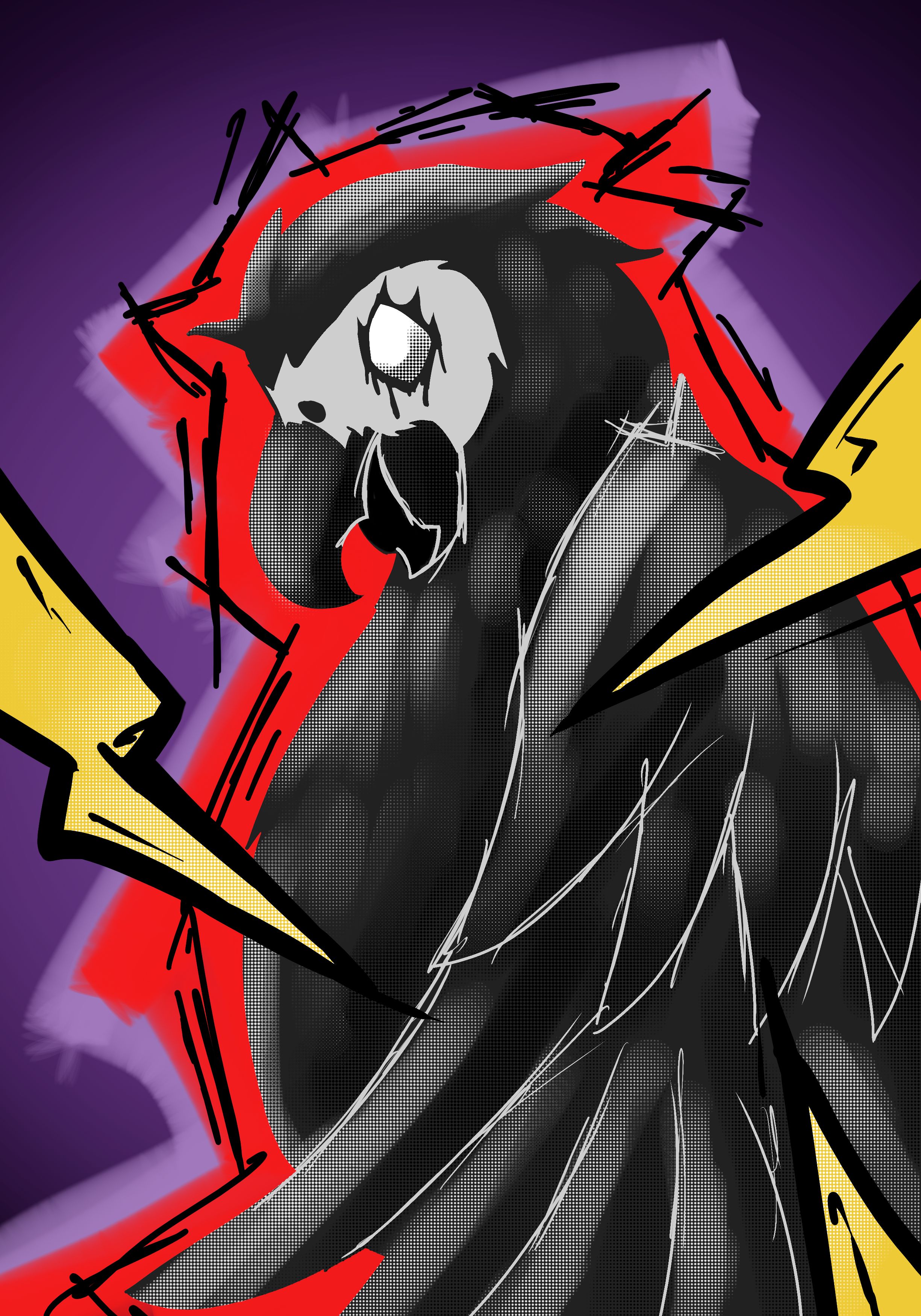Alternatively put, the wolves that don’t have cancer resistance do not survive Chernobyl. I feel like this should be closer to the default way we talk about evolution.
That’s what natural selection is. We focus on those that survived because they developed resistance to something, but it has always meant that everybody else died and the species as a whole has moved forward.
Sure but the headline doesn’t say ‘natural selection caused . . .’ it straight up say ‘Mutant wolves developed resistance to cancer’ did they though? Or was that mutation already present and sudden environment changes cause the other ones to die off?
Cancer-causing radiations don’t cause wolves to develop cancer resistance, they cause wolves to develop cancer. Those that were more resistant survived, those that weren’t didn’t, now we have wolves that are different from those that we had before. They are mutant wolves, but the radiations didn’t make them mutants. The mutation happened before in some wolves, and their descendants survived better than those that didn’t have it. Evolution has always been like that.
So we don’t have wolves that are different from those we had before. We have the same wolves we had before and also we don’t have other wolves we also had before.
“We are the cancer now”
And I for one welcome our Lupine overlords. I’d like to remind them of my long history of caring for their canine cousins and the potential for that to continue long into the future.
I, for one, (a vampire Goth) fear for my life when our werewolf overlords enter society …
How they see you:

40 years seems like a relatively short time for natural evolutionary processes to adapt a mammal to a highly radioactive environment. That’s like 10 to 20 generations of wolf and suddenly they are cancer resistant?
After all the needless loss of life surrounding the Chernobyl reactor explosion, finding viable cancer-resistant genetic mutations would be the ultimate silver lining.
A mutation for having a higher radiation resistance or higher resistance to cancer is something that already happens in nature, but in most of the animal world those are relatively useless traits, normally cancer doesn’t develop fast enough to stop procreation.
In Chernobyl, the highly elevated radiation would normally kill animals before they can even breed. The ones that don’t have the resistance die before they get the chance, the ones that do have a higher resistance breed.
With humans in the modern age, a resistance to cancer or radiation trait never gets the chance to become a dominant evolutionary trait as most all people only develop the cancer later in life and the ones that do get cancer early more and more often can get treatment giving them a chance to procreate even when they got cancer young.
Outside Chernobyl, there is no evolutionary pressure for a trait like that to become dominant.
Living long enough to procreate is the primary drive in nature.
We generally don’t see fast evolutionary changes in nature because nature doesn’t change quickly often.
Leave it to us, humans, to create situations where the change is drastic and quick.
If you have an extremely high infant mortality rate, it won’t take that long. If the radiation kills off a high enough percentage of individuals without cancer resistance it won’t take long at all.
Theoretically you could do it in only 2-3 generations if you had environmental factors that could give 100% of individuals without resistance cancer.Only if you have some individuals with [cancer or whatever] resistance though.
Everyone has “cancer or whatever” resistance. That’s why DNA works, it has repair mechanisms.
Getting cancer is when that mechanism either fails or isn’t good enough to repair the damage.
Abnormal radiation levels can cause an excess of damage or different type of damage than what your natural mechanism is capable of fixing.
We’re constantly being radiated, we’re constantly employing our resistances and defenses against radiation.
We float around on a rock in a sea of radiation and even we ourselves emit low levels of (mostly harmless) radiation.
And that trait does exist in nature already, it’s just rare and mostly useless until environmental pressures only allow those individuals to reproduce.
The thing is, the exclusion zone isn’t uniformly radioactive. The hottest spots are not areas that wild life would normally spend a lot of time near.
Then there’s the fact that the way we’re all taught about radiation and cancer is just flat out wrong. The Linear No Threshold model that most people know was actually created by the Rockefeller Foundation in an attempt to slow the adoption of nuclear power.
Combine those two factors, and you get stories like this, where researchers are shocked that higher than average radiation exposure doesn’t equate to a simple linear increase in cancer rate.
Not that these wolves haven’t developed an increased resistance to radiation. But it’s not a new thing. Every living creature on this planet has mechanisms to repair DNA from radiation exposure. These wolves are simply better at it now than generations past.
High evolutionary pressure + large gene set = fairly rapid adaptation
evolution could happen in jumps. How often that happens is debatable.
“The Mutant Wolves of Chernobyl” seems like a good band name.
“Wolves of Chernobyl” is a song by Municipal Waste, already
No surprise. It’s too good a name.
Thank goodness, someone can inherit the Earth after we kill ourselves.
So radiation does give you powers ?
So radiation does give you powers ?
Well… radiations selects for powers.
Nah, just filters out those that are weaker/less resistant.
Everyone has radiation resistance. Our DNAs repair mechanisms protect us from DNA errors from all sorts of sources.
A region where high radiation exposure becomes daily life simply makes the this trait the dominant one for animals to live long enough to procreate, meaning the ones with the best mechanisms will survive, the others die.
The viltrumite way ?
It’s a bit tautological. Yes, you get powers, but only “radiation resistance” power from radiation.
Chernobyl dogs: “We have developed immunity to cancer”
Pripyat cats: m̴̳̏ẽ̸̥e̸̫͆e̸̋͜o̸̹͝ó̴̫ẅ̸́ͅw̶̧̄
Here is an alternative Piped link(s):
m̴̳̏ẽ̸̥e̸̫͆e̸̋͜o̸̹͝ó̴̫ẅ̸́ͅw̶̧̄
Piped is a privacy-respecting open-source alternative frontend to YouTube.
I’m open-source; check me out at GitHub.
… wasn’t there basically no additional cancer present in mammals over there?
And even in humans - hasn’t only thyroid cancer spiked in the months after the accident?
Oh, she claims these wolves are genetically different than others (or that all wolves are better at beating cancer?) … I don’t understand that claim. And if that’s true, then why not test DNA/immune system of humans living very near there (The Babushkas of Chernobyl?
Kyle Hill has some pretty good videos on this topic: https://youtu.be/bmVGwOP_zi8?feature=shared
My understanding is that while the fallout from Chernobyl wasn’t very dangerous, and didn’t lead to a noticeable increase in cancer rates, the area around the reactor is still very dangerous due to the debris from the reactor core that’s scattered around.
Here is an alternative Piped link(s):
https://piped.video/326wzbsmjGk?feature=shared
Piped is a privacy-respecting open-source alternative frontend to YouTube.
I’m open-source; check me out at GitHub.
deleted by creator
I think the only “power” you get from radioactive wolves is death.
but what a way to go, huh? “torn apart by mutant wolves” is a pretty metal death
The Chornobyl Exclusion Zone continues to fascinate me, both irl and virtually.
This is the best summary I could come up with:
Mutant wolves roaming the deserted streets of Chernobyl appear to have developed resistance to cancer - raising hopes the findings can help scientists fight the disease in humans.
A nuclear reactor exploded at the Chernobyl power plant in Ukraine in 1986 - with more than 100,000 people evacuated from the city as the blast released cancer-causing radiation.
Cara Love, an evolutionary biologist and ecotoxicologist at Princeton University in the US, has been studying how the Chernobyl wolves survive despite generations of exposure to radioactive particles.
Ms Love and a team of researchers visited the CEZ in 2014 and put radio collars on the wolves so that their movements could be monitored.
The researchers discovered that Chernobyl wolves are exposed to upwards of 11.28 millirem of radiation every day for their entire lives - which is more than six times the legal safety limit for a human.
Ms Love presented her findings at the annual meeting of the Society of Integrative and Comparative Biology in Seattle, Washington, last month.
The original article contains 406 words, the summary contains 168 words. Saved 59%. I’m a bot and I’m open source!
You’re telling me that I should last my body with radiation and I’ll become immortal? Sign me up.












